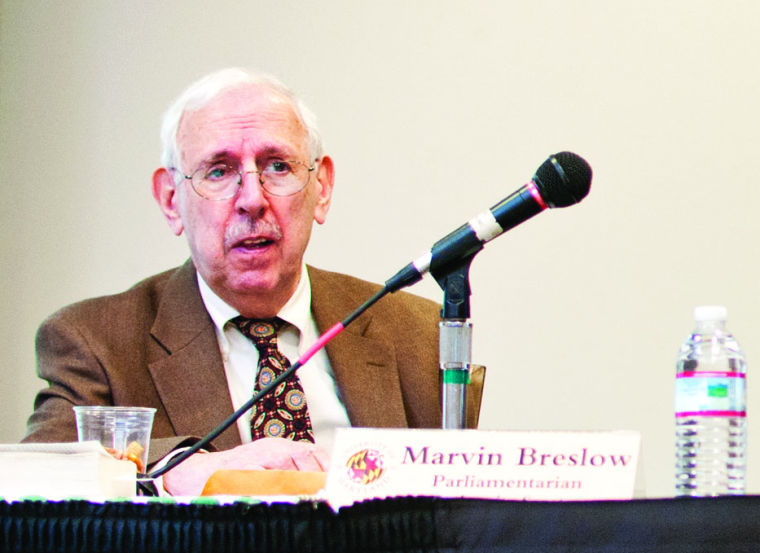
University Senate parliamentarian Marvin Breslow.
Ask most people at this university about the biggest disruptions they’ve experienced in College Park, and they’ll point to the masses gathered on Route 1 after Terrapins basketball victories or losses.
Ask Marvin Breslow, and he’ll take you back to the late 1960s and early 1970s, when students and antiwar demonstrators on the campus clashed with the National Guard and staged sit-ins to protest U.S. military involvement in Vietnam.
“We had riots on this campus,” said Breslow, parliamentarian emeritus of the University Senate and a retired history professor. “You went to classes and you could smell the tear gas from the night before.”
Breslow, 77, came to the university in 1962 to teach English history. That was right in the middle of the war, and the public — especially young people and students — was livid. Breslow said the tensions led directly to reforms at the university.
“The campus and the structure of campus governance changed with the civil disruptions over the Vietnam War here,” Breslow said.
In 1970, eight years after his arrival from Harvard University’s graduate school, Breslow became involved in the university’s shared governance. But before Vietnam protests — riots, sit-ins, teach-ins and general disruptions — gripped the campus, Breslow said the University Senate was a toothless body.
The senate only met twice per year, compared to eight or nine times now, and Breslow said it served mainly as an outlet for the university president to give policy addresses.
“Mainly, it was there to hear the speech from the throne and then go home,” he said.
But as the war dragged on and dissenting voices on the campus grew louder, Breslow said administrators started to listen more to the community and pay more attention to shared governing efforts such as the senate. From there, he said the senate in its current incarnation began.
As the senate progressed, so did Breslow’s involvement. He led several senate committees over the years and was elected the chairman of the full senate for the 1997-1998 academic year.
After retiring in 2000 and being named professor emeritus, he continued his involvement with the senate, serving as parliamentarian — a procedural guide and rules adviser for the senate — for the next 12 years.
He stepped down prior to the start of this academic year, but he will stick around in the interim as an informal adviser.
The parliamentarian is a critical role, said Vincent Novara, senate chairman. Breslow’s knowledge of the university’s and senate’s history, Novara said, was vital to the senate.
“He has tremendous knowledge in his mind of the history of the senate and the University of Maryland,” Novara added. “He has been involved with it in so many different capacities that he’s basically seen it all. There’s nobody here who has the same level of deep knowledge that Marvin has.”
Ken Holum, who replaced Breslow as parliamentarian, said Breslow’s array of experiences at the university and knowledge of senate rules and history makes his a hard act to follow.
“It’ll take me some time to get up to speed, and to follow Marvin Breslow is probably more than you could ask anyone to accomplish,” Holum said.
Since he’s been at this university, plenty has changed, including the evolution of the senate and the administrative structure of the university. In 1988, more than 25 years after Breslow’s arrival, the University System of Maryland formed, transforming this university from a more isolated state school to the flagship institution of 11 total colleges and universities. It was easier to work under the previous system, Breslow said.
“The mission of so many of the schools are so very different that I don’t think it really works to everybody’s best effect,” he said. “But we’ve learned to live with it, and we’ve carried a lot of the burden of it, the help with the administering of the smaller schools and stuff like that.”
Before that change, Breslow spearheaded a different sort of reform on the campus. In 1976, he chaired the senate committee that brought about the university’s first transition to a general education curriculum that mirrors the one in effect today. That work, he said, is one of his proudest accomplishments in 50 years at the university.
Alongside his work in the senate, Breslow spent his career teaching English history to several generations of students. The Lincoln, Neb., native attended the University of Nebraska before heading to Harvard for graduate school. But the expert on Tudor and Stuart England was drawn to this university in part by its proximity to the Folger Shakespeare Library in Washington.
“We talk about, ‘Gee, the Washington area is a great attraction for those who want to do various kinds of work in scholarship, research, stuff like that,’” Breslow said. “Well, the Folger Library was very important for me.”
His intellect and experiences made him an asset to the classroom and in the history department’s planning room, Holum said.
“He was one of the most gracious and intelligent colleagues in the department who inevitably had good judgment about the department and the way we ran things,” Holum said, “and was also a really excellent teacher and scholar.”
Among his senate work, research and teaching, Breslow has spent his adult life working on the campus. To hear him tell it, he wouldn’t have it any other way.
“This was my kind of involvement in the community of the university. It’s a community of many things and purposes, and I just have always been involved in that kind of thing,” he said. “There’s something very special about universities for me, as a way of life.”



